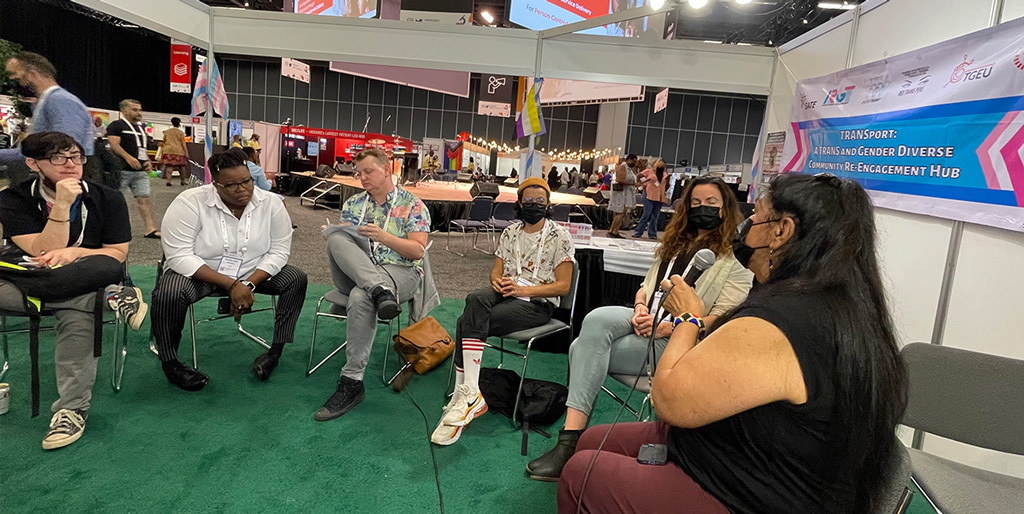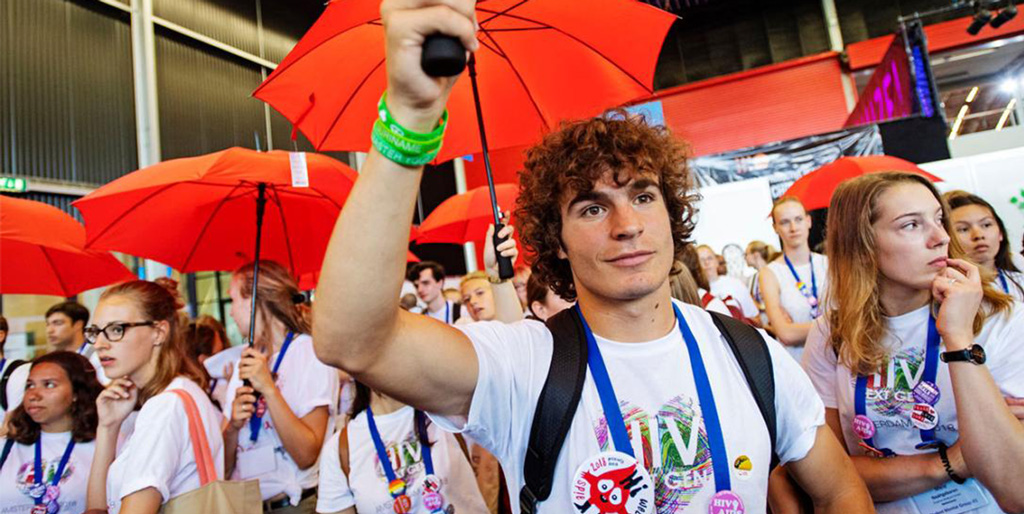Ahead of of the International AIDS Conference – AIDS 2024, as part of the regional #PutPeopleFirst campaign, VirusOFF meets with leading experts from the Eastern Europe and Central Asia (EECA) region to discuss key aspects where health and human rights come to the fore. These issues not only have a significant impact on the lives of people living with HIV, but also determine the effectiveness of public health policies and programs in the region.
Walls are not the answer. #PutPeopleFirst!
You can learn more about the EECA region and AIDS 2024 at aids2024.virusoff.info and our social networks.
Maka Gogia, Georgia.
VirusOFF has the pleasure of speaking with Maka Gogia, Doctor of Medicine (MD) and Master of Public Health (MPH), who serves as the Program Director of the Georgian Harm Reduction Network (GHRN).
Maka brings a wealth of experience in managing public health initiatives, particularly in the areas of HIV, Hepatitis C, B, and harm reduction programs.

In light of the recent legislative changes in Georgia, Maka will dwell on the challenges and implications of the new law “On Transparency of Foreign Influence” for public health services in the country. VirusOFF will also explore Maka’s goals and expectations for the upcoming AIDS 2024 Conference and the key issues she hopes to address to improve public health in Georgia and the broader Eastern Europe and Central Asia (EECA) region.
Maka, how will the new laws affect the situation in Georgia and the region as a whole, especially in terms of HIV and access to services?
What changes can we expect in the next few years?
Maka: Against the backdrop of intense public protests, the Georgian Parliament passed a new law “On Transparency of Foreign Influence” on June 3, 2024. This legislation has raised significant concerns among civil society organizations (CSOs), community members, and development partners working in the areas of HIV, tuberculosis, viral hepatitis, and sexually transmitted infections.
The law requires NGOs that receive more than 20% of their annual budget from international sources to register with a public registry of foreign influence agents. This requirement stigmatizes civil society, program workers, and their communities by suggesting that they are working against the interests of their homeland.
What specific threats do you foresee this new legislation posing?
Maka: The new legislation poses several significant threats:
- Increased State Control: The requirement for NGOs to register as foreign agents increases government control. This could lead to the blocking of donor funding for public health purposes if it is deemed not to be in the government’s interest.
- Discreditation and Removal: The government gains the power to discredit and remove any NGO that does not align with its interests.
- Privacy Violations: Government agencies may access the personal information of staff and clients from stigmatized or criminalized communities in the context of HIV/TB services. This breaches confidentiality and undermines trust in these programs, reducing coverage of the target population.
Have similar laws been enacted elsewhere, and what were the outcomes?
Maka: Yes, we saw similar laws implemented in Russia in 2012, with detrimental effects. Vulnerable populations supported by international donors were left without basic services. It became impossible to protect their rights, and victims of violence were left unprotected. HIV organizations lost foreign funding, halting critical HIV prevention services and ultimately leading to their closure. Those that continued to operate faced increased government scrutiny and control, which hampered their activities.
What actions are Georgian CSOs taking in response to this bill?
Maka: When the Georgian Parliament began discussing the bill on April 17, CSOs and activists on the ground sent an official letter to Peter Sands, Executive Director of the Global Fund to Fight AIDS, Tuberculosis and Malaria. He proposed to initiate discussions within the Country Coordinating Mechanism (CCM), chaired by the Minister of Health. We are awaiting this meeting and have also requested technical assistance from the Global Fund to assess the impact of the law on HIV and TB services.
This support will help CSOs explore options to secure operations, continue advocacy efforts, and create an enabling environment for service delivery. We plan to hold a multi-stakeholder strategic planning workshop with a focus on security and contingency plans for implementers.
What are the immediate steps CSOs must take according to this new bill?
Maka: Until August 2, we are waiting for the statutes to be developed under this new law, which will make it actionable and provide more details about the potential risks. According to the new law, CSOs will have to register as agents of foreign powers in a public registry by next month.
Failure to comply will result in severe penalties, starting at GEL 25,000, plus GEL 10,000, increasing indefinitely. Even if we do not register in the prescribed manner, we will still be required to register and face penalties.
How do you see the future of HIV, HCV and TB services for your beneficiaries in this challenging environment?
Maka: We find ourselves in an unprecedentedly challenging environment. Despite the difficulties, we hope to find ways to ensure the uninterrupted continuation of HIV, HCV and TB services for our highly stigmatized and marginalized beneficiaries. Our commitment to these communities remains steadfast, and we will continue to seek support and develop strategies to navigate this new legal landscape.

What are your goals and expectations for participating in the Conference?
What questions and topics do you plan to discuss?
Maka: The goals and expectations for participating in the AIDS 2024 Conference are:
- To expand my knowledge and stay informed about the latest research, advances, and trends in HIV/AIDS prevention, treatment, and care. I expect to gain insights from cutting-edge studies and innovations from leading experts.
- These types of conferences are the best places to network, build, and strengthen professional relationships with researchers, healthcare providers, policy makers, donors, and activists. In the past, I have had the opportunity to identify potential collaborators for future projects and share best practices.
- Advocate for tailored interventions for vulnerable populations, influence policy discussions, and drive action towards inclusive health strategies.
- Participate in workshops, panel discussions, and interactive sessions.
Will you (and/or GHRN) be presenting any projects, research, or initiatives at the conference?
Maka: At this conference, I will present my research abstract “Assessing risky behavior among PWID in the country of Georgia – results from simplified bio-behavioral survey methodology, the BBS-Lite” as a poster presentation to increase the visibility of my research and receive feedback from the global scientific community. I will also participate in events organized by the European HIV/Viral Hepatitis Testing Committee (ETW) and the Silver Zone organized by EATG and other European partners.
What are the main issues and challenges faced by key communities in Georgia and the broader EECA region that you hope to address at the Conference?
Maka: Key issues include ensuring a smooth transition of HIV prevention programs from Global Fund to domestic funding, maintaining comprehensive packages for key populations, minimizing risks to NGOs involved in HIV and TB service delivery imposed by the Georgian government through the adoption of the new Law on International Influence/Agent’s Law, and advocating for uninterrupted service delivery to marginalized communities in the country.
In your opinion, what changes in policy and practice could result from the discussions at the Conference? How can such events impact the HIV situation in our region?
Maka: In my opinion, Conference discussions will bring the following changes in policy and practice:
- Enhanced policy support for key populations by developing and implementing laws that protect the rights of key populations, such as transgender individuals, sex workers, and people who use drugs.
- Practice change: Increase funding and support for community-based organizations that work directly with these populations.
- Improved access to HIV prevention and treatment by ensuring universal access to PrEP, PEP, and ART by integrating these services into national healthcare systems and reducing costs.
- Combating stigma and discrimination by enacting anti-discrimination laws and policies to protect people living with HIV and key populations in healthcare, employment, and education.
- Integration of mental health services into HIV care programs to address the psychological impact of HIV.
Such events can impact on the HIV situation in the EECA region by sharing best practices, innovative approaches and successful case studies that can be adapted to the EECA region. They can also influence advocacy and the mobilization of resources and political will to address challenges.
In addition, collaboration between key regional and local stakeholders can facilitate effective cooperation that can strengthen the regional response to HIV through shared resources and coordinated efforts.
See you soon at #AIDS2024
Learn more about Eastern Europe and Central Asia at AIDS 2024: aids2024.virusoff.info – or on our main web page: VirusOFF.info
Follow us on social media to keep up with important updates:
Instagram – Virus off
Facebook – Virus Off




